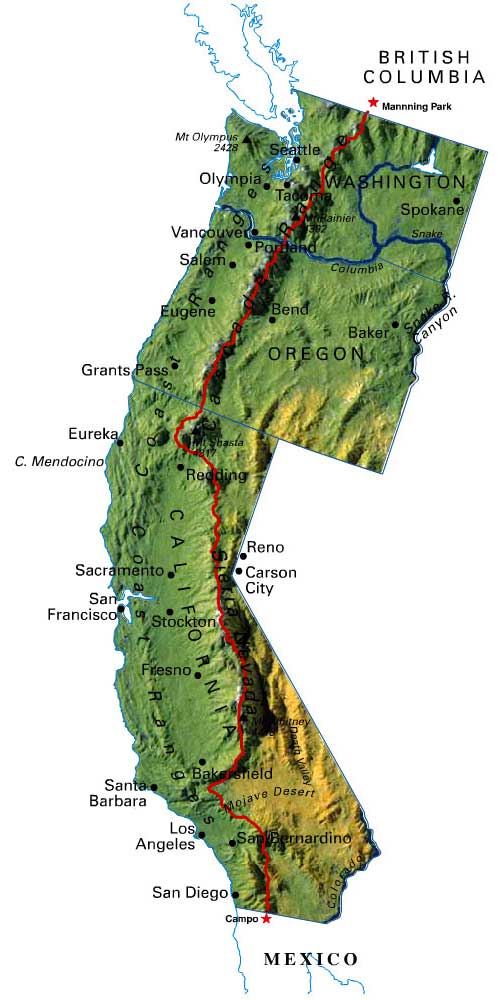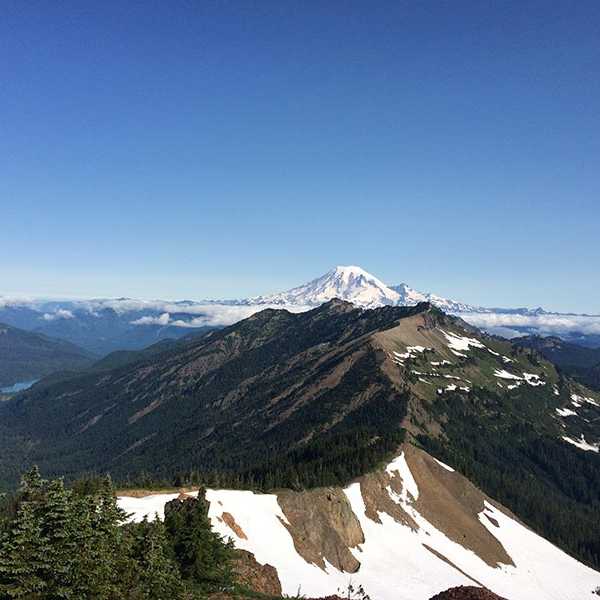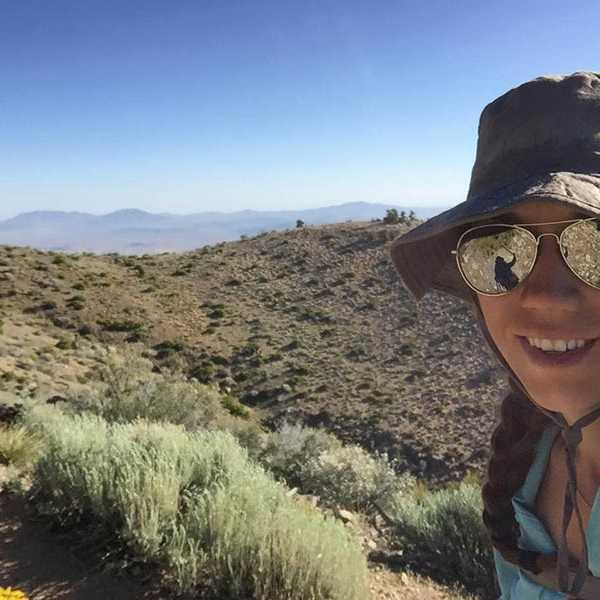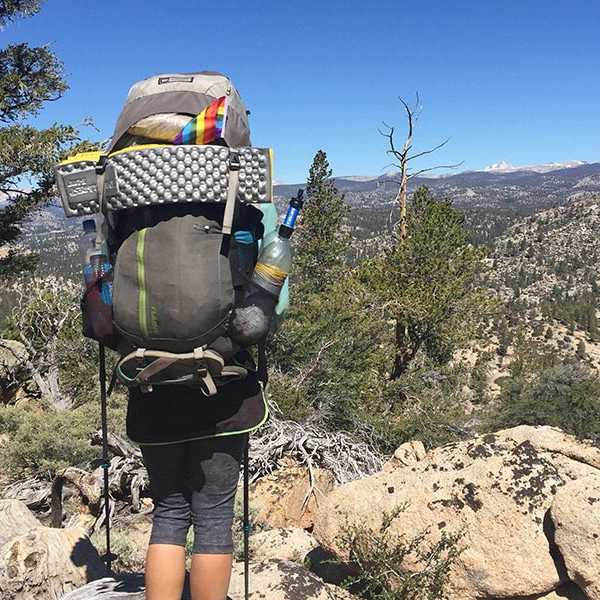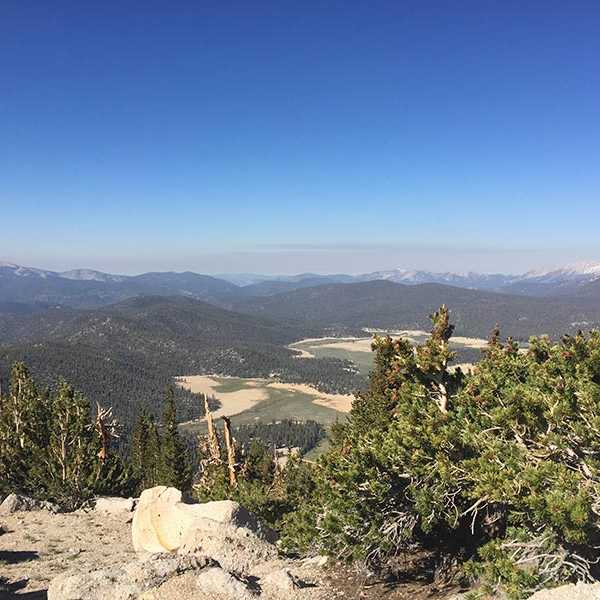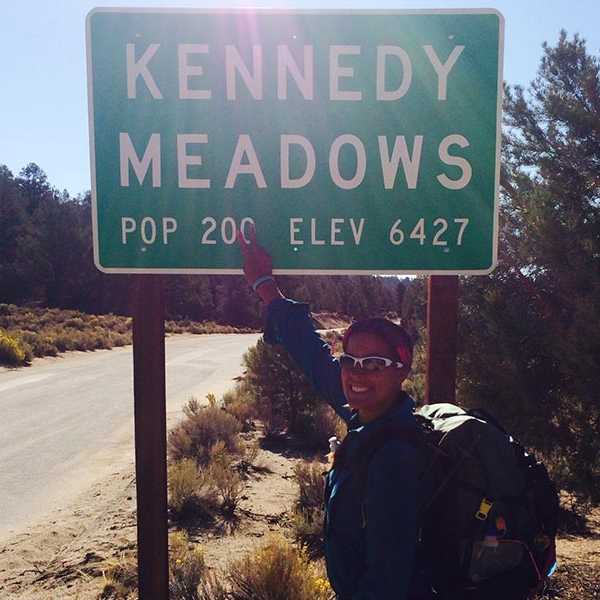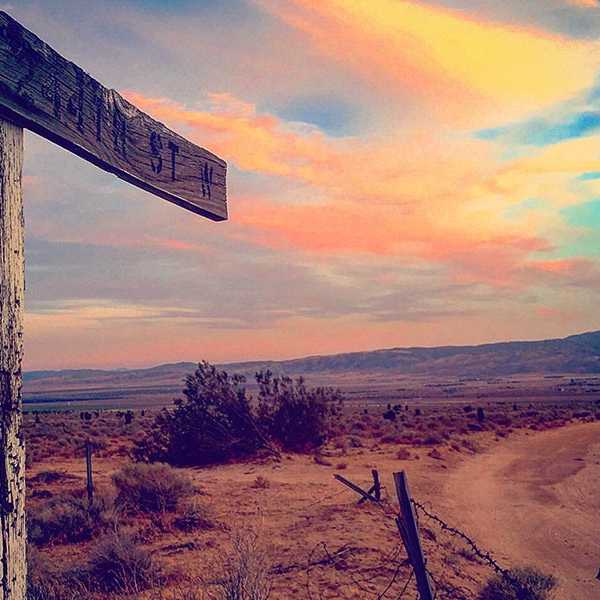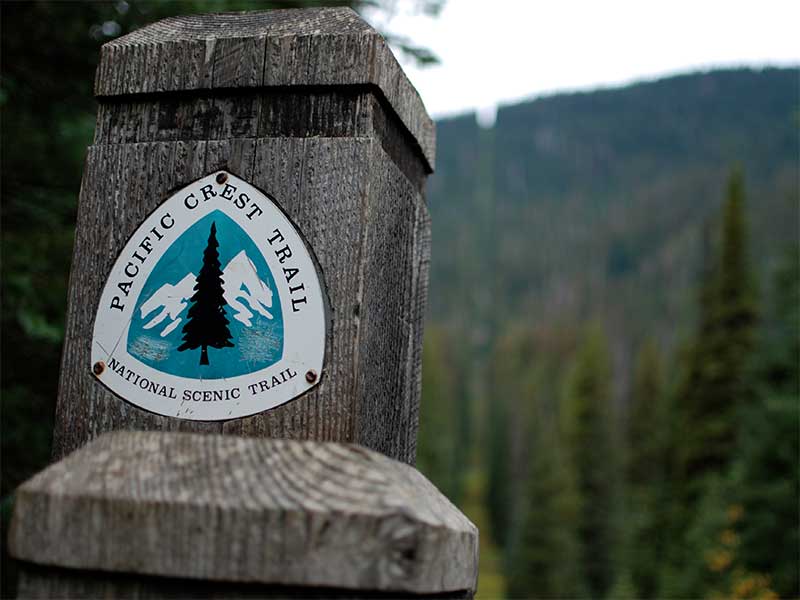“Mile 766 — a bad day turned to amazing campsite with a view and happy feet. I don’t want to climb tomorrow. It’s about the PCT and family.”
Elise (Boldt) Woodsmith ’09 has a lot of days like this on her monthslong journey across the Pacific Crest Trail. And she tackles them one step at a time and with a little help from new friends she’s made along the way.
“Mile 673 — Mamba just passed me, and Yardstick is behind me too. Huge morale boost knowing I’ve got some friends around.”
Wordsmith quit her job on a Friday. The following Monday, she started hiking. She isn’t doing it to “find herself” or to achieve a lifelong fitness goal. She’s doing it to learn about the beautiful region she lives in that many people take for granted. Eventually, she will share her favorite spots with the people she loves most.
“Traveling abroad (at PLU) taught me that there is so much out there to see,” Woodsmith said in a recent interview during one of a few planned breaks from hiking. “Why not see it in my backyard?”
The Pacific Crest Trail spans about 2,650 miles from Mexico to Canada. It snakes through mountain ranges, national parks and three states — California, Oregon and Washington. Hundreds of thousands of hikers use the trail annually, according to the Pacific Crest Trail Association. Thru-hikers — those who make the entire trek in a single trip — finish the journey in about five months on average.
Woodsmith said she isn’t a thru-hiker, but that doesn’t mean she hasn’t covered a lot of ground. She had walked 1,600 miles by the end of August, documenting every step of the way and sharing it with a dedicated social media following.
Struggles are a constant: Woodsmith averages about 18 miles per day. She left her husband, PLU alumnus Nat Woodsmith ’09, behind for much of the trip. Her feet grew two sizes in just a week of hiking the trail. She can only pack what she can carry; her backpack weighs a maximum of 36 pounds at any given time. And some sections of the trail are void of water.
“The most challenging thing has been water management,” Woodsmith said. “There’s a stretch coming up of 42 miles without water. I’ve been going 17 miles without water sources fairly consistently.”
She said part of the community building that occurs on the trail is recognizing that everyone is facing the same challenges, and recognizing that some handle those challenges differently.
“We’re all struggling together,” she said. “Everybody’s hurting, but we’re managing it because it’s a necessary part of life.”
Her Facebook post just before Mile 673 reads, “5 miles into this morning and all I can think is how crazy I am to be back out here and how much I miss Nat. I am sick to my stomach, what am I doing out here?
Walking.
Just keep walking.
This too shall pass.”
But the experiences Woodsmith stumbles upon make the hard stuff worth it. There’s the community.
“Mile 704.68 — Kennedy Meadows! Got clapped in today, which was really special.”
There’s the cause that keeps her going.
#WeAreOrlando
And, of course, there’s the beauty nature has to offer. Woodsmith says one of her favorite stops has been the San Jacinto wilderness near Idyllwild, California.
“It goes from boulder gardens to massive sugar pine forests down onto a 20-mile descent without water,” she said. “It’s beautiful, it’s challenging, it’s scary all at the same time.”
Alexis Ballinger ’12 can relate. She said pictures from her Pacific Crest Trail hike in 2014 don’t do it justice. She said the hike through the high Sierras in California was physically challenging, as was the jaunt through Glacier Peak in Washington. But the views there were breathtaking, she said.
“We had a sunset when we were up there,” Ballinger said of one of the highest peaks in the state. “All the pinks, yellows and oranges you could imagine. It makes you wonder how all this beauty came to be.”
For Ballinger, her so-called “flip-flop” hiking experience was a new challenge that set her up for conquering future challenges. She started in June 2014 and finished in November that year, hiking from the Oregon-California border north to Canada then driving south to hike through California to Mexico.
She spent four nights total in hotels; the rest of the nights were spent camping under the stars. She and her high school friend walked every day in the same clothes. “We stunk pretty bad,” Ballinger said, laughing.
Much like Woodsmith, Ballinger entered into a community with many people from all walks of life. “I met people from all over the world,” she said, noting that many came to the Pacific Crest Trail because it’s unlike anything else in the world. “We have something really special here when it comes to conservation.”
Ballinger also learned a lot about her personal needs and consumption. At the beginning of her journey, her backpack weighed about 45 pounds; at the end it weighed about 20. She started walking an average of 13 to 15 miles per day, only to increase that average distance to 25 to 28 miles per day. She lost 25 pounds and learned the importance of clean, dry socks.
“I really learned how much I can push myself and how mentally strong I really am,” Ballinger said. “It made me way more mentally tough than I thought I was.”
That epiphany still works to her advantage. When Ballinger learned she qualified for Iron Man Kona in Hawaii with just four months to train, she never doubted her abilities.
“If I can survive the trail, I can survive this,” she recalled telling herself. “It really pushed me through that whole race.”
But Ballinger still had moments on the Pacific Crest Trail that challenged her willingness to continue. She recalled one moment during a phone conversation with her mother in which she threatened to quit.
Her mom wasn’t having it.
“She said, ‘You’re so close. You only have 400 miles to go. Hang up the phone and I’ll talk to you at your next stop,’” Ballinger said. “I would have definitely regretted not completing the trail. It was quite an accomplishment for sure.”
Both Woodsmith and Ballinger — who studied business and political science, respectively — say PLU helped them prepare for their big adventures.
Woodsmith said thoughtful inquiry and embracing community are part of the fabric of the Pacific Crest Trail, just as they are a part of the fabric at PLU. Ultimately, those lessons have helped her come to terms with the unpredictability of the journey she is on.
“It’s about being open to any experiences life is going to throw at you,” she said.
Ballinger said her hike underscored her love of the environment that grew out of the Antarctica study abroad program she was a part of during her time at PLU.
“I’m thinking of going to law school and dealing with environmental issues,” she said. “Doing the trail really heightened that passion.”
Ballinger said there is much to gain for everyone who hikes the Pacific Crest Trail in some fashion. “I think everyone should do this, even if it’s just a weeklong hike,” she said. “You learn to appreciate the little things in life that are forgotten a lot.”
And don’t let your personal limitations scare you out of it, she said.
“You don’t know how far you can go until you do it,” Ballinger said. “One foot in front of the other.”


